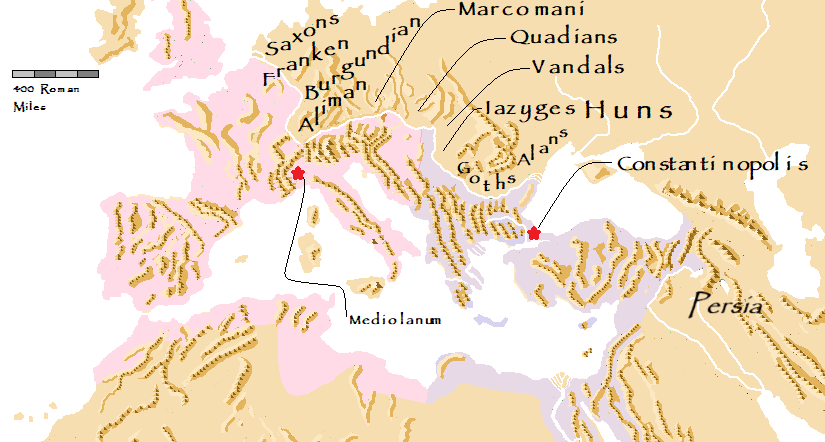top of page



Notable Novel Characters
The Bandit King
Alaric the Goth's
Road to Rome

Timgad, Old City -- Creative Commons

Rome's Greatest Fear Was The Collapse Of Its Borders

Border Neurosis
Rome, a city of thieves and bandits, had a problem of declining birthrate for the lack of women.
The senate suggested the city sponsor a regional festival, inviting the neighboring cities to gather outside its walls and join the celebration.
It was a trap.
The men of Rome suddenly swooped out and abducted enough women to ensure a steady birthrate, and dragged them inside the city’s walls.
When negotiations for the return of the women failed, one by one the cities declared war on Rome. Each were defeated except the Sabines.
The Sabines marched on Rome and the siege continued until a Vestal Virgin, Tarpeia, betrayed Rome and opened the gates to the Sabine army.
It did not end well, the Sabines were expelled and Tarpeia was flung from the eighty-foot high cliff that still bears her name, The Tarpeian Cliff.
Rome was surrounded by potentially hostile tribes and needed allies. When the Celts began a migration south from the Alps, the Etruscians asked Rome for military aid.
Rome sent an army of 10,000. The Celts sent 30,000. It did not end well for Rome. The Celts followed the retreating Roman army. Buildings were burned or plundered, and most of the Roman senate was put to the sword at the Forum.
The surviving Romans fortified themselves atop the Capitoline Hill repelling several Celtic attacks. The Celts left the city only after the Senate agreed to pay one thousand pounds of gold.
After the Celts were gone their neighbors thought Rome weak and tested their resolve.
Romans were victorious and rebuilt, but they never forgot.
Rome learned to never trust its neighbors. Driven by the fear that the neighbors would plot against them, Rome surrounded itself with trusted allies, whether they liked it or not.

Short
Stories at Amazon Kindle
B0FT75NBPT
He sold himself into slavery and became a gladiator to buy the freedom of the woman he loved

B0FTSD8JZS
To escape slavery, Gaius abandoned his inheritance



Protecting the Protectors
Rome learned to never trust its neighbors again. Driven by the fear that the neighbors would again plot against them, Rome surrounded itself with trusted allies, whether they liked it or not.
Rome’s problem was, if it expected its neighbors to protect Rome’s borders, Rome had to protect its neighbors.
Rome’s allies along the Adriatic Sea were having their ships and ports raided and robbed by Illyrian pirates. Rome sent an ambassador to the Illyrians protesting their raids.
When the Illyrian queen, Teuta murdered the ambassador, The legions marched.
Queen Teuta signed a treaty when Rome captured Illyrian ports then marched inland. Demetrius, her successor, did not honor Teuta’s treaty and encouraged Macedonia to join in its war.
Their belligerence ended and Rome’s Adriatic allies were again safe when Rome’s other war, with Carthage, ended and those legions sailed to Greece and Illyricum.
In the west, the remnants of Hannibal’s defeated army encouraged the northern Celtic tribes to rebel and Rome marched north.
In the east, Romans sent legions east of the Alps against Celtic and Illyrian tribes who both raided into northern Italia and along the Adriatic Sea coast. Rome conquered the tribes adding the Pannonians and the Danube River as another layer of protection.
Bribery and embezzlement became widespread as corrupt officials divertied resources intended for training, equipment, and supplies for the army, Like leaches, they sucked money for personal gain and the treasury’s ability to fund the army withered.
In the west, Germanic and Gallic tribes saw the Roman army’s weakness. They decided it was a good time to migrate into northern Italia. It did not go well for them.
Several generals decided they would personally foot the bill for the army’s upkeep and marched to face the invaders, defeated them, and made the Rhine River and the oceans Rome’s northern borders.
Terving Goths settled north of the Danube. Rome hired them to act as a protector of the Danube border. East of the Terving were the Greuthung Goths.
Rumors of a new menace beyond the Volga River, eight hundred of miles from Rome’s borders came to Constantinopolis. Too quickly this new threat, the Huns, overcame the Alans and then the Greuthung.
The new threat north of the Black Sea was overshadowed when Persia claimed Armenia, a client state of Rome. Which now was the greater threat? Armenia, a shield against Persia, or the Goths, a shield against the Huns. Persia, was the greater danger, and must be dealt with first. Put Persia in its place, then settle the Danube border. Rome just needed more men.
The Greuthung Goths were a horse people, the Terving fought on foot. They were no match for the swift Huns. The Goths fought, retreated and they fought again until there was nowhere for them to retreat except beg entrance into the empire for protection.
The Romans knew they would bring their families, livestock, and spring seed for planting, but the process of planning and then placing a whole tribe into a province was slow and Fritigern, desperate. Generals Lupicinus and his aid Maximus set out the conditions for who, among the Goths, may cross and where.

B0FTXXRD9N
Rome may have driven the pirates from the Mediterranean, but they still raided along the Atlantic coast from Britain to North Africa

B0FTV74B4N
Mummification was big business. Everyone died, everyone had to be mummified.
The humble Egyptian was limited by the size of their purse.
The unethical embalmers preferred taking short-cuts.
Consequences of Greed
When the emperor permission was received, the Goths stampeded across the Danube, not just in the designated crossing points, but it everywhere seemed.
Seeing the desperation of the Goths, Lupicinus and Maximus also saw an opportunity to increase their personal wealth.
The two generals immediately sent thousands of warriors marching toward Asia Minor. The emperor got the warriors he needed to face the Persians.But the thousands sent south was not enough to ease the strain on the supplies the Romans had gathered in anticipation to the migration. The Goths begged for more food for them and their families and the generals saw a chance to make a sizable profit from the Goth’s misery.
Their message to the hungry Goths was: because of drought, grain must be brought from farther away. To get the grain quickly, the Goths must help pay for the higher cost of shipment.
The Goths paid till they had no more to pay. The generals demanded their children in exchange for dog meat.
When the Goths learned there was no real shortage, but a deliberate attempt to profit from their suffering, the Goths marched to the provincial capital, Marcainjopolis, and demanded grain.
Fearing a Gothic uprising, Lupicinus invited the Reiks to dine and settle their complaints in a civil manner.
At the feast the Romans attempted to assassinate the Gothic reiks hoping that without leadership, the Gothic army would disperse.
They were wrong.
The Gothic War -
During the war that followed, the Goths defeated the Romans at the battle of Marcianopolis, at the battle of the Willows, and finally at the battle of Adrianopolis where the Emperor Valens was killed and half of the Eastern army was destroyed.
To save Roman Thracia from destruction, Theodosius, the new emperor, offered a very lenient treaty. The Goths could settle in selected areas in the province of Lower Moesia without the burdened of tax demanded of Romans.
In exchange, they must vow to provide the Roman army with warriors when needed.
This was the root of the Bandit King series.
The Novels
During the civil war between the emperors Maximus and Theodosius, while the legions (East and West) were fighting each other east of the Julian Alps, there was much lawlessness and banditry in both empires. One of those bandits was Alaric.
For three years he and his little army terrorized Roman Thracia. Then in August of AD 391 he attacked the emperor's caravan, an assault that could not go unpunished. Safely back in Constantinople, Theodosius sent General Promotus to capture or kill the brazen bandit. It was a task more difficult than Promotus expected.
Alaric and Promotus clawed at each other, leaving a bloody trail through the Rhodope mountains. If Alaric lost, his warriors would die in the arena and their women be sold into slavery. For Promotus, to fail would be a shame he could not endure.

Available on Kindle
bottom of page